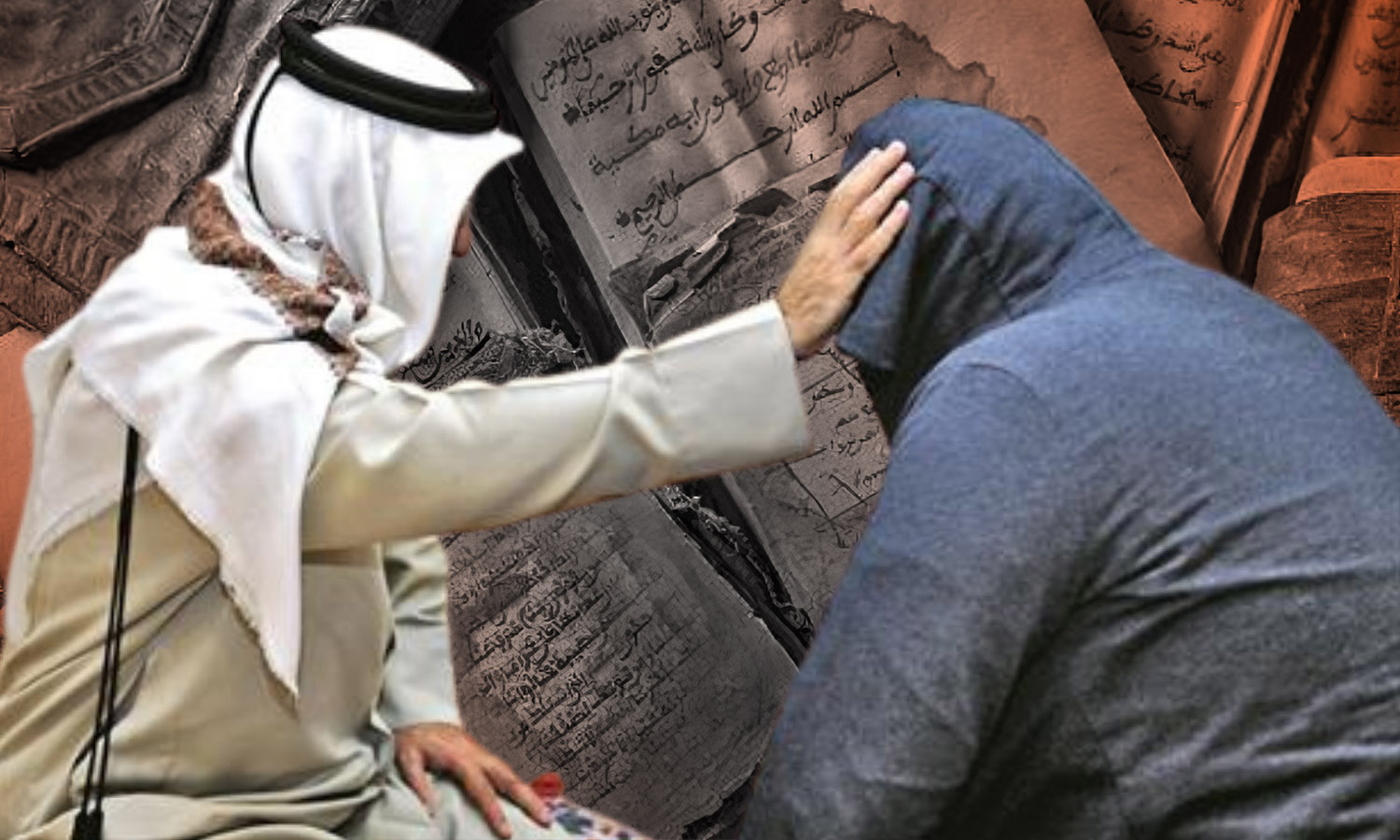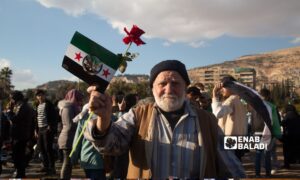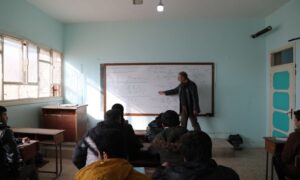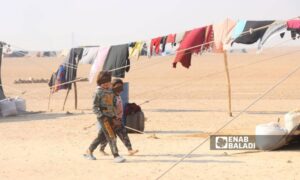
‘Al-Roqyah’ turns a legalized profitable business for charlatans in Idlib

Enab Baladi – Lujain Mourad
“Go to Sheikh’, the first advice I had received when I disclosed my head’s chronic pain,” said the 25-year-old Kanaz who endured to a circle of exploitation by the so-called al-Raqi who claims to extract ‘jinns and the evil eye’ by reciting “Roqyah,” an Islamic Sharia method which was taken from its main religious content by a group of swindlers.
“He put a blindfold on my eyes and put my feet in water then led me to put the phone on my ear, while he was whispering what he claimed were verses from the Holy Quran,” Kanaz, who declined to give her full name for social reasons, said describing the atmosphere of the first visit to one of the Roqyah’ centers’.
The self-proclaimed ‘therapists’ claim that Roqyah, or the ‘exorcism,’ is protecting the soul from the evil eye and envy through reciting verses from the Holy Quran and supplications from the Sunnah of the Prophet Muhammad so the jinn and devils would be expelled from the ‘possessed person.’
Kanaz’s society is the victim of the outdated customs, underdeveloped educational methodology, societal backwardness, poverty and indigence, a decline of general culture and collective awareness due to the long years of war and decades of totalitarian rule, neglecting certain areas and leaving it to the control of groups that exploit the members of society financially and intellectually.
Raqis claim no sorcery
“During the Roqyah session, the Raqi told me after removing the blindfold from my eyes that in the first time he burned the jinn with Quranized water, and in the second time the jinn converted to Islam and went to Saudi Arabia,” said Kanaz in an ironic tone.
Kanaz was not the only one who was subjected to such practices, as one of the houses echoed with the screams of a person during his ‘treatment’ session, but in fact, the ‘patient’ was exposed to violent physical assault, while the Raqi claimed that the jinn is the one who is in pain now.
One of the Raqis, Abu Hamza, 45, told Enab Baladi that the ‘Roqyah’ saved the people in light of the spread of sorcery and magic that was planted in food and drink and inside people’s homes.
“The jinn can ‘possess’ a person after pouring hot water into the sink or drain because he was harmed or because he loves a person, and this requires the existence of such a role (Roqyah) to preserve the safety of the people,” according to Abu Hamza.
Everything that takes place inside these houses is referred to the (Islamic) Sharia, such as anointing the “possessed person” with oil and blowing into his drinking water, and other rituals that he claimed are free from false beliefs and sorcery, Abu Hamza claims.
|
The Roqyah is reciting verses from the Holy Quran to the patient, without engaging in any other practices, in order to seek healing. Sheikh Mustafa al-Hamod |
A false belief turned into social norm
Kanaz admits that the prevailing mindset of society is what dragged her to ‘sorcery’ as a cure.
“Most of the people around me repeated the advice to go to one of the (Roqyah houses) until I believed it was the only solution to my problem.”
The culture of society has a great impact on people’s lives, as the transformation of false beliefs into a common thought in a community can force the person to follow them, sociologist Safwan Qassam told Enab Baladi.
Qassam added that the repetition of an idea contributes to the orientation of society members, explaining that when an individual is met with the call of people surrounding him, the person can turn towards a certain idea even if it contradicts his/her beliefs.
Sorcery rites to meet people’s needs
Residents of the northern Idlib region suffer from a severe lack of basic life necessities, in light of the deterioration of living conditions, the poor education standards, and the impact of the Syrian conflict on their lives, which makes them in a state of fear and instability on an almost daily basis.
Such matters of magic, jinn, and sorcery have a ground, taking advantage of the society’s fear of things that they consider outside the scope of their awareness and ability to assimilate.
“My head’s pain was not my only suffering, but the Raqi’s words about jinn possessing someone has turned into a constant panic for me as one of those possessed.” Kanaz justifies why she repeatedly visits the Roqyah house.
In his turn, Abu Hamza says the merit of Roqyah is to initiate people’s comfort,” and that is why dozens of people seek Roqyah every day.
The sociologist Safwan Qassam said that the practitioners of this sorcery depend on people’s constant need to feel safe and secure.
Qassam explained that these people benefit from two feelings, “fear and repose,” a person’s fear of “the metaphysics” such as the jinn, and his feeling of reassurance as a result of his belief that the practice of “the Raqi” was able to harness fear for his benefit.
Enab Baladi consulted the social researcher Mohammed al-Salloum, who considered that people’s inability to solve their problems is caused by the living situation and ignorance, which pushes them to search for a satisfactory solution in proportion to their material and cultural capabilities.
“People’s need for spirituality is not limited to their beliefs and faith, as their social status plays an essential role in resorting to witchcraft,” al-Salloum said.
Medical consultancy is absent
Kanaz did not find anyone to direct her to visit the doctor and perform tests to check on her health, but she found many opinions that referred her to visit the “Sheikh” as the best treatment for every symptom she felt.
“The pain was unbearable, and I needed a quick and feasible solution, and the first advice I received when expressing my severe pain in my head was (Go to the Sheikh),” Kanaz explains why she went to the Raqi before visiting the doctor.
Kanaz found that the “treatment” sessions were useless. Rather, the tension she felt during the “sessions” with the Raqi was one of the causes that increased her headache. At that time, she decided to visit the doctor, only to realize that she suffers from migraines.
“I felt comfortable when the doctor diagnosed my condition, as he lifted superstitions from my shoulders. I only wished that one person had guided me to the right place from the beginning,” Kanaz added.
In his turn, social researcher Mohammed al-Salloum said that people’s inability to access appropriate medicine, and the difficulty of visiting medical clinics due to their weak financial ability, is one of the most prominent factors in the spread of false beliefs and sorcery.
“When we became aware of a person’s need for a specific medicine, we were forced to present it to him through one of the sheikhs,” said sociologist Safwan Qassam, explaining that “Sheikhs” sometimes have more authority over patients than the authority of doctors.
Mental health
People usually ignore the necessity of mental health and its role in solving many of their daily problems for reasons related to religious beliefs, ignorance, or fear of social classification.
“False beliefs about psychiatry are not limited to one category of society, as they are affected by religious beliefs and the culture of the entire community,” said the Turkey-based psychiatrist Jalal Nofal, indicating the passive estimate of most Syrians towards psychiatry.
In an interview with Enab Baladi, Nofal said numerous reasons prompted people to find refuge in superstitions and rely on people who claim they are specialized in psychological therapy, like the decline in the educational level, social solidarity, and lack of rational understanding, along with the decline in the quantity and type of health institutions in Syria which leads to such misconceptions and methods.
The “Roqyah” does not contradict with psychological treatment, but rather one of the dimensions of mental health is to benefit from the harmless practices that are common among the common people, according to Nofal.
Nofal added that the “Roqyah” when it involves any practices other than reciting the Quran, becomes useless and may turn into physical or psychological harm.
The researcher and sociologist Safwan Qassam considered that ignorance of diseases and mental disorders drives people to resort to those who call themselves “Sheikhs” to deceive people with practices that contradict religion.
Mowaffaq Amouri, an Idlib-based doctor, discovers that many of his patients told him that they had been exploited by people as “Sheikhs,” who practiced sorcery.
In an interview with Enab Baladi, Amouri added that the culture of society considers symptoms of mental illness as a “misfortune,” witchcraft, or “the evil eye.”
Visiting a psychiatrist is also linked to “madness,” which drives many people to avoid visiting, according to Amouri.
Amouri pointed out that some “Sheikhs” direct patients to psychiatric clinics, but it is a small percentage compared to the dozens who take advantage of this to practice magic and sorcery.
|
Mental disorders: a combination of abnormal thoughts, perceptions, emotions, behavior, and relationships with others. Mental disorders include depression, bipolar disorder, schizophrenia, and other psychoses, dementia, and developmental disorders, including autism. Availability of health care and social services capable of providing means of treatment and social support is one of the most important ways to overcome mental disorders. World Health Organization |
Emptying pockets in religion name
Although the people Enab Baladi spoke to believed in the importance of the existence of Roqyah’ therapy’ places, most of them admitted that dozens of “Raqis” took advantage of their work to steal in the name of religion.
According to what Enab Baladi monitored, the requests of some “Raqis” vary, between demanding money or gifts whose value differs from one person to another.
“On my first visit, I took dates and fruits according to the neighbors’ suggestion, and on the second time, one of them advised me to put the money under the pillow. I have been robbed without my knowing,” Kanaz said.
Abu Hamza believes that his 25-Turkish-Lira wage for Roqyah is fair since “he and many others are fully dedicated to helping people by Roqyah,” as described.
Under cover of the de-facto authority
Idlib is labeled as a conservative region with a religious character due to falling under the control of the Hayat Tahrir al-Sham (HTS), formerly known as al-Nusra Front, which rules its areas by the Islamic Sharia, imposing ideas that some describe as “fanatic,” since its members set themselves up as “the guardians of the virtue.”
The Syrian Salvation Government (SSG), Tahrir al-Sham’s civil governing partner, backs hardline ideas and practices as the “Endowments Ministry” is considered the first responsible for the “Roqyah” centers and for the Raqis whose tariff is set by the ministry, according to what Enab Baladi monitored.
All people who work in the “Roqyah” are subjected to “Sharia exams” by the ministry before being licensed, according to Abu Hamza.
Enab Baladi contacted the Salvation Government to obtain clarification, but it did not receive a response.
Between Shariah and law
Mohammad Habash, the founder of the Studies Center for Civilization and Enlightenment Research, told Enab Baladi that any practices claiming to deal with the jinn are a violation of Sharia and have no Islamic basis.
The prominent scholar added that everything about dealing with the jinn and expelling them with amulets and talismans or wrong practices is a form of ignorance and cannot be considered a science field or a legitimate profession.
On the other hand, the Syrian Penal Code criminalizes anyone who deals with the intent of profit, soliloquy, hypnosis, astrology, palm reading, playing cards, and everything related to the prescience with a fine.
Whoever repeats this crime is also punished by imprisonment, and he can be deported if he is a foreigner, according to Article No. 754 of the Syrian Penal Code.
if you think the article contain wrong information or you have additional details Send Correction
النسخة العربية من المقال
-
Follow us :

















 A
A
A
A
A
A








 More Society
More Society